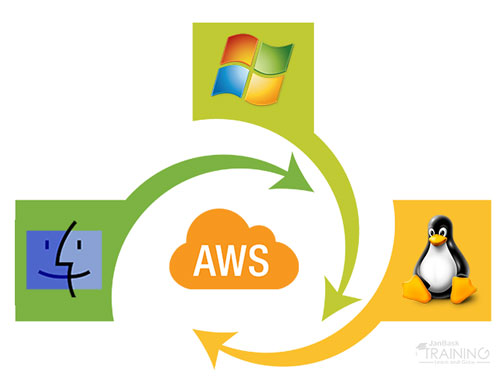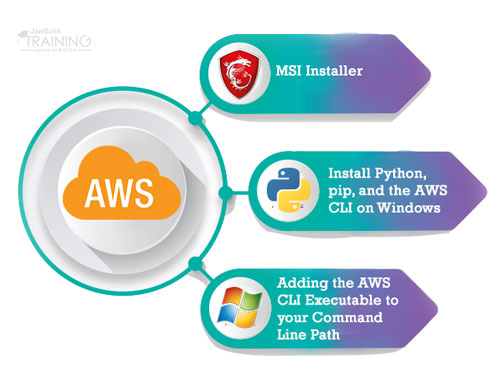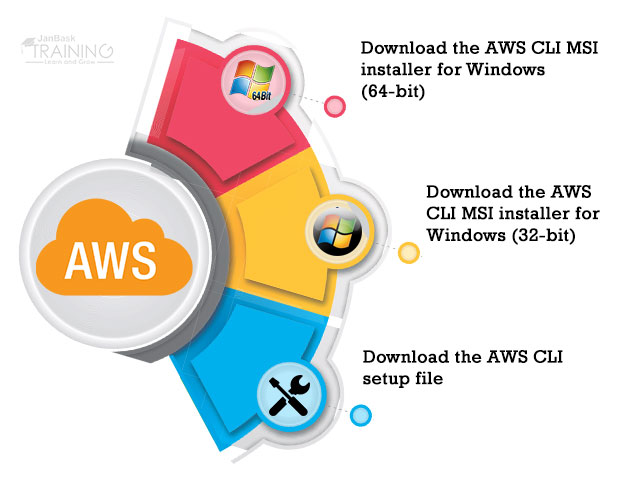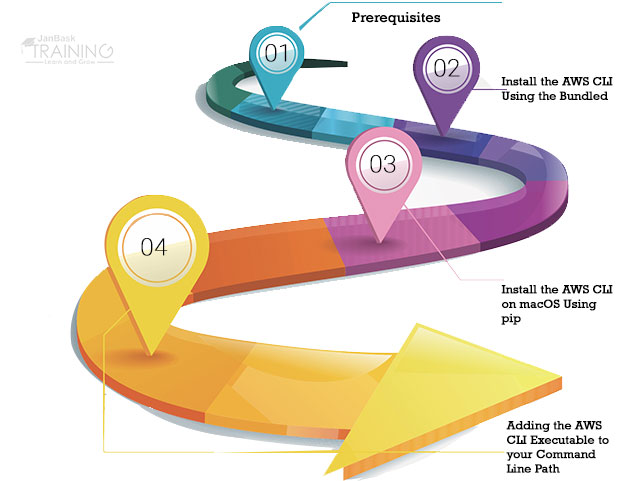22
SepGrab Deal : Upto 30% off on live classes + 2 free self-paced courses - SCHEDULE CALL
The AWS Command Line Interface (CLI) is an instrument given by AWS to deal with our AWS administrations. Utilizing this single instrument, we are ready to oversee diverse AWS administrations from the order line. Indeed, we can even computerize diverse errands utilizing scripts.
In this blog, we shall discuss the steps in which you can install AWS Command Line Interface on- 
You can install the AWS CLI on Windows with an independent installer or pip, a package manager for Python. Here is what we will discuss - MSI Installer
MSI Installer
The AWS CLI is bolstered on Microsoft Windows XP or later. For Windows clients, the MSI establishment bundle offers a commonplace and a more advantageous approach to introduce the AWS CLI without introducing some other essentials.
At the point when refreshes are discharged, you should rehash the established procedure to get the most recent variant of the AWS CLI. In the event that you want to refresh as often as possible, think about utilizing pip for simpler updates.

Note:- The MSI installer for the AWS CLI does not work with Windows Server 2008 (adaptation 6.0.6002). Use pip to introduce with this variant of Windows.
The CLI introduces to C:\Program Files\Amazon\AWSCLI (64-bit form) or C:\Program Files (x86)\Amazon\AWSCLI (32-bit variant) naturally. To affirm the establishment, utilize the AWS - adaptation order at a direction prompt (you can open the Start menu and scan for cmd to begin a command prompt).
C:\> AWS –version
aws-cli/1.16.71 Python/3.6.5 Windows/10 AWS botocore/1.12.61
In the event that Windows can't discover the program, you may need to close and re-open the order provoke to revive the way or add the establishment registry to your PATH condition variable physically.
The AWS CLI is refreshed normally. Check the Releases page on GitHub to see when the most recent rendition was discharged. To refresh to the most recent form, download and run the MSI installer again as discussed above.
The Python Software Foundation provides installers for Windows that include pip. To install Python3 and pip (Windows)
The installer installs Python in your user folder and adds its program folders to your user path. To install the AWS CLI with pip (Windows)
C:\Windows\System32> python --version Python 3.7.1 C:\Windows\System32> pip --version pip 18.1 from c:\program files\python37\lib\site-packages\pip (python 3.7)
C:\Windows\System32> pip install awscli
After installing with pip, add the AWS program to your OS's PATH environment variable. With an MSI installation, this should happen automatically, but you might need to set it manually if the AWS command doesn't run after you install it.
You can find where the AWS program is installed by running the following command:
C:\> where AWS
C:\Program Files\Python37\Scripts\aws
The suggested method for introducing the AWS CLI on macOS is to utilize the packaged installer. The packaged installer incorporates all the conditions and can be utilized offline. The accompanying things are talked about in this segment Important
Important
The packaged installer does not bolster installing to paths that contain spaces.
Prerequisites
Command you need to check your Python installation:
$ python –version
Read: AWS, Linode & DigitalOcean Compared- All you should know
Read: Make Your AWS DevOps Engineer Resume More Attractive? Get Your Dream Job Fast
In the event that your PC doesn't as of now have Python already installed, or you might want to introduce an alternate rendition of Python, pursue the technique in Install the AWS Command Line Interface on Linux.
Pursue these means from the command line to introduce the AWS CLI utilizing the packaged installer To install the AWS CLI using the bundled installer
$ curl "https://s3.amazonaws.com/aws-cli/awscli-bundle.zip" -o "awscli-bundle.zip"
$ unzip awscli-bundle.zip
Note
In the event that you don't have to unzip, utilize your Linux conveyance's built-in package manager to install it.
$ sudo ./awscli-bundle/install -i /usr/local/aws -b /usr/local/bin/aws
Note As a matter of course, the install script keeps running under the framework's default form of Python. On the off chance that you have introduced an elective adaptation of Python and need to utilize that to install the AWS CLI, run the install script determining that variant by including the supreme way to the Python program. For instance:
$ sudo /usr/local/bin/python3.6 awscli-bundle/install -i /usr/local/aws -b /
This order introduces the AWS CLI to/usr/nearby/aws and makes the symlink aws in the/usr/neighborhood/canister catalog. Utilizing the - b alternative to make a symlink dispenses with the need to indicate the introduce catalog in the client's $PATH variable. This should empower all clients to call the AWS CLI by composing AWS from any index.
You can likewise utilize pip straightforwardly to introduce AWS CLI. On the off chance that you don't have pip, adhere to the directions in the principle establishment theme. Run pip - rendition to check whether your variant of macOS as of now incorporates Python and pip.
Command to check pip version:
$ pip --version
To install the AWS CLI on macOS
$ twist - O https://bootstrap.pypa.io/get-pip.py
$ python3 get-pip.py - user
$ pip introduce awscli - upgrade - user
$ aws - version
$ pip introduce awscli - upgrade – user
In the wake of installing with pip, you may need to add the AWS program to your OS's PATH condition variable. The area of the program relies upon where Python is introduced.
If you are not aware as to where Python is installed, run which python command as shown.
$ which python
/usr/local/bin/python
The command output could be the path to a symlink and not the actual program. Run the prompt ls -al to see where it points you to. You can also run the following:
Read: How AWS Shared Responsibility Model Strengthens Cloud Security?
Read: How can AWS SysOps Certification Spur your Career?
$ ls -al /usr/local/bin/python ~/Library/Python/3.7/bin/python3.7
pip installs programs in a similar folder that contains the Python program. Add this folder to your PATH variable.
You can install the AWS Command Line Interface and its conditions on most Linux circulations with pip, a package manager for Python.
Important
The awscli bundle is accessible in storehouses for other bundle administrators, for example, APT and yum, however, you are not ensured to get the most recent variant except if you get it from pip or utilize the packaged installer.
In the event that you as of now have pip, adhere to the guidelines in the fundamental establishment subject. Run pip - version to check whether your rendition of Linux as of now incorporates Python and pip.
$ pip –version
On the off chance that you don't have pip, verify which form of Python is installed using the command
$ python --version
or
$ python3 --version
In the event that you don't as of now have Python 2 adaptation 2.6.5+ or Python 3 rendition 3.3+, you should initially introduce Python. On the off chance that you do as of now have Python introduced, continue to introducing pip and the AWS CLI. This section covers the following topics-
This section covers the following topics-
Installing Pip
On the off chance that you don't as of now have pip introduced, you can introduce it with the script given by the Python Packaging Authority.
To install pip
$ curl -O https://bootstrap.pypa.io/get-pip.py
$ python get-pip.py --user
At the time you include the --user switch, the script installs pip to the python path ~/.local/bin.
. .. .bash_logout .bash_profile .bashrc Desktop Documents Downloads
export PATH=~/.local/bin:$PATH
$ source ~/.bash_profile
$ pip --version
pip 18.1 from ~/.local/lib/python3.7/site-packages (python 3.7)
Installing the AWS CLI with Pip
Utilize the pip to install the AWS CLI.
Read: 10 Ways To Fuel Your Career in Cloud Computing
Read: Everything You Need to Know About an AWS Solutions Architect Salary
$ pip install awscli --upgrade --user
At the time you use the --user switch, pip automatically installs the AWS CLI to ~/.local/bin.
You have to verify that the AWS CLI is installed correctly by the following command.
$ aws --version
aws-cli/1.16.71 Python/3.6.5 Linux/4.14.77-81.59-amzn2.x86_64 botocore/1.12.61
If you want to upgrade to the latest version of the tools, run the following installation command again:
$ pip install awscli --upgrade --user
Subsequent to introducing with pip, you may need to add the aws executable to your OS's PATHenvironment variable.
You can confirm which folder pip installed the AWS CLI in by running this direction:
$ which aws
/home/username/.local/bin/aws
You can reference this as ~/.nearby/container/on the grounds that/home/username compares to ~ in Linux.
On the off chance that you overlooked the - user switch and in this manner didn't install in user mode, the executable may be in the folder organizer of your Python establishment. On the off chance that you don't know where Python is installed, run this command:
$ which python
/usr/local/bin/python
The output might be the way to a symlink, not the real executable. Run ls - al to see where it focuses.
$ ls -al /usr/local/bin/python
/usr/local/bin/python -> ~/.local/Python/3.7/bin/python3.7
If this is the same folder you added to the path in step 3 in Installing Pip, then you are done. Otherwise, perform those same steps 3a thru 3c again, adding this additional folder to the path.
In the event that this is a similar envelope you added to the way in stage 3 in Installing Pip, at that point you are finished. Something else, play out those equivalent advances 3a through 3c once more, adding this extra organizer to the way.
Conclusion
I know the discussion above was pretty overwhelming. Do not worry. Break down your reading into segments as we have done while explaining the different segments to you. If you have any further queries, let us know in the comments below.
 Pinterest
Pinterest
 Email
Email
The JanBask Training Team includes certified professionals and expert writers dedicated to helping learners navigate their career journeys in QA, Cybersecurity, Salesforce, and more. Each article is carefully researched and reviewed to ensure quality and relevance.

Cyber Security

QA

Salesforce

Business Analyst

MS SQL Server

Data Science

DevOps

Hadoop

Python

Artificial Intelligence

Machine Learning

Tableau
Search Posts
Related Posts
How to Start a Career in AWS as a Developer?
![]() 261.5k
261.5k
Is the AWS Big Data Certification Worth It? Learn How to Pass Certification In First Attempt
![]() 217.3k
217.3k
Know Everything About Cloud Computing
![]() 506.6k
506.6k
AWS Solution Architect Roles and Responsibilities: You Need To Know!
![]() 14k
14k
Difference between AWS Inspector and AWS Trusted Advisor
![]() 833.6k
833.6k
Receive Latest Materials and Offers on AWS Course
Interviews